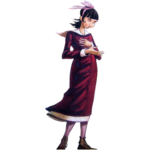Hey guys. So I want to talk to you about one of the greatest heroines ever written for young adult literature, and that is A Series of Unfortunate Events’ Violet Baudelaire.
In any discussion of women in YA lit, there are basically three names that come up: Bella Swan (generally derided as weak and useless), Hermione Granger (whom everyone agrees is THE BESTEST!!!!), and Katniss Everdeen (jury’s still out on that one, but the consensus as far as I’ve seen is that feminist bloggers and Twilight haters alike super love her). Violet rarely comes up, which I think is a shame, because I would argue that she’s perhaps better written than all three of those other young women.
Note that I’m not saying she’s a better woman. This isn’t one of those posts where someone tries to empirically prove that this character is TOTALLY BETTER than that character, because I find that sort of thing dull and counterproductive. I’m not trying to pit different ladies against each other, because I’m generally against that sort of thing (though I don’t think having a preference between two female characters or real-life women makes you sexist). This is more of an exploration on how young women are treated in books geared toward tweens, and how we could all perhaps take a lesson from Daniel Handler (a male writer, interestingly enough) in this arena.
The first thing that strikes me when analyzing ASOUE from a feminist perspective is that Violet is, of course, a skilled inventor, a field in which you don’t see many fictional women. A different writer might have stuck to more “traditional” gender roles and cast Violet as the bookish wordsmith and Klaus as the science-minded inventor, but wouldn’t that have been boring, really? The boy tinkers around in his laboratory and invents things that save the day, and his sister occasionally correctly defines a word. Boring. But what’s even more interesting to me is that Violet, despite having tremendous skill in a traditionally “non-feminine” area, is never presented as The Exceptional Woman, which is perhaps my least favorite trope in fiction, one that has ruined countless characters for me (Veronica Mars, Ginny Weasley, River Song). Rather, each of the kids in the book has one particular skill that saves everyone else’s asses at least once, and even among the girls, they’re evenly split between the “feminine” (Sunny the cook, Isadora the poet) and the “masculine” (Violet the inventor, Fiona the mycologist).
Furthermore, her looks are only commented on once or twice, and always by another character – never by herself or the narrator. This is significant. Young women in literature are almost always given a thorough physical description, whether it’s fawning or, more commonly, one of those “So-and-so was hardly beautiful – in fact, she was really rather plain, with boring brown eyes and long dark hair that fell into her face” deals that contemporary authors love. Even in Harry Potter and The Hunger Games, Katniss and Hermione’s appearances are mentioned quite a few times. But in ASOUE, none of the Baudelaire kids are really described in detail, aside from Klaus’s glasses (which are often a plot point) and Violet tying up her hair when she has to think. THIS IS HUGE. I don’t know if I’m making a mountain out of a molehill here, but honestly, it’s so refreshing to see a teenage girl character who isn’t defined in any way by her looks, whether beautiful or exceptionally “plain.” It simply doesn’t matter; she’s got 99 problems but a zit ain’t one. Similarly, while she and Klaus both get romantic subplots with tertiary characters, they never threaten to take over the actual plot. These kids are kind of busy trying to escape a crapton of people who want them dead, and there’s not a ton of time left over to moon over Quigley Quagmire (though I loved their little romance, don’t get me wrong!).
Furthermore, LET’S TALK ABOUT THE MORAL AMBIGUITY OF THIS CHARACTER. There are quite a few moments in the books wherein Violet and Klaus discuss whether or not their actions – causing lots of deaths, burning down the carnival and the Hotel Denouement, et cetera – mean that they’re just as bad as the people from whom they’re running. I mean, there have probably been lots of essays written about how smart these books are (come on, it’s essentially a kids’ book series about ethical relativism!) but honestly, how often in the lit world, kids’ or adults’, do you see teenage female characters struggling with these kinds of huge moral issues? Not particularly often, to my knowledge.
This obviously isn’t the most well-written little post and I’m probably going to revise it a bunch of times until it’s actually a smart piece of analysis and not just a FEELINGS GEYSER about a criminally underrated kids’ book series, but for now, I’m just going to post it and that’s that.
The end, but not really.

Just another WordPress site
